When we first launched Cambio Market, we only had two products. One of them was our collection of handcrafted greeting cards from Good Paper (made in partnership with The Paper Project in the Philippines). To our delight, these cards quickly became one of our bestsellers. Since then, our customers have had nothing but rave reviews thanks to our cards’ high quality, delicate textures, and witty designs. So when we booked our flights to Philippines and embarked on our two-month adventure, we jumped at the opportunity to meet the makers of our cards in person.
Our meeting with The Paper Project
Good Paper is a social enterprise based in the United States. They conceptualize each card, manage the marketing, design, and distribution of the cards in North America (hence why each card is labelled as a Good Paper card). However, each card is physically made in the Philippines by The Paper Project, a social enterprise in Manila that makes the paper and is responsible for hiring, training, and educating each of the women who make the cards.
When we went to Makati in Manila, we not only met with one of the founders of The Paper Project but also got to visit their main office and see the card makers in action!
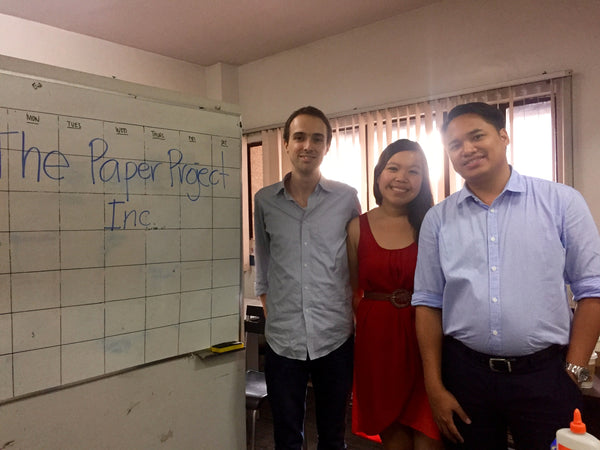
Jérôme, Gelaine y Benjamin Aritao from The Paper Project
We met with Benjamin Aritao, one of the founders of The Paper Project. Their social impact is clear: give former victims of sex trafficking in the Philippines a second chance at life. They do this by employing sex trafficked women as card makers in order to give them job skills, a reliable income, and dignified work.
Giving sex trafficked victims dignified work
As Benjamin explained to us, simply pulling women out of the sex trade often is not enough. Most of them have little or no education, little experience in the job market, and a limited social network to help them get back on their feet. Without proper support, many of the rescued women become trapped in the same cycles of poverty that made them vulnerable to sex trafficking in the first place. Sadly, some rescued women even end up at risk of “re-trafficking”.
This is what The Paper Project aims to address. Through them, each woman receives much-needed work experience, regular income, and employment skills development,
“We teach them key skills that many of us take for granted – such as showing up to work regularly and on time, or how to speak politely and use appropriate language in the workplace,” Benjamin says. Beyond the tangible benefits like salary and skills training, The Paper Project is also doing another key thing – they’re restoring the dignity of these women. Benjamin recalled to us a time that a partner came to visit their offices and, upon seeing the women, said to him, “Do you realize this is probably the first time in these women’s lives that they are working with men who actually respect them?”
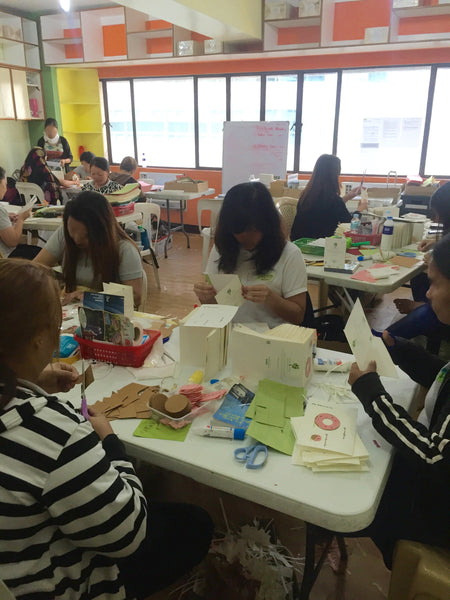
The Paper Project employs former victims of sex trafficking in the Philippines. This photo has been blurred to protect the identities of the women.
While some of the women have been regular employees since the beginning, The Paper Project is also perfectly happy if some women use them as a platform to get training and then transition onto other opportunities. And their model works! They have been increasing their production for five years and now employ 80 women. Sometimes, demand for their cards is so high that they can barely keep up.
“Each time we scale up and improve our operations to meet demand, the next month all of our efforts are redundant. Demand just keeps growing,” Benjamin says with disbelief.
He then adds with a smile, “Which is a good problem to have.”
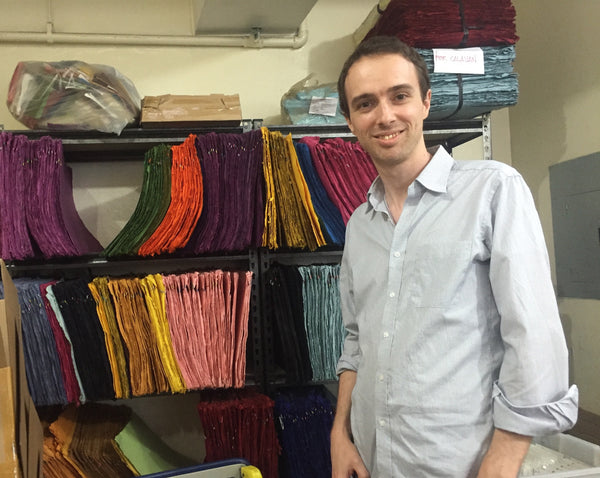
The Paper Project not only makes the cards by hand, they also make their own paper
So how are the cards made?
It first starts with the paper. The paper is handmade from recycled materials in their factory in Laguna, Philippines – an area where there is high unemployment, poverty, and desperation (the perfect place for sex traffickers to source victims). In their factory, they employ men from the Gawad Kalinga relocation centre community (Gawad Kalinga is a prominent Filipino non-profit committed to ending poverty).
To make the paper, they use semi-processed abaca paper, which is the same raw material used to create currency paper. They purchase the leftovers and lower quality versions of abaca and then mix it with recycled paper to create the final paper for the cards. The finished paper then gets sent to Makati in Manila where the text and shape templates are printed for each card. Some paper stays for the women working on site and others are distributed to their other production centers in Laguna and in Pampanga. That’s where the cards are made.
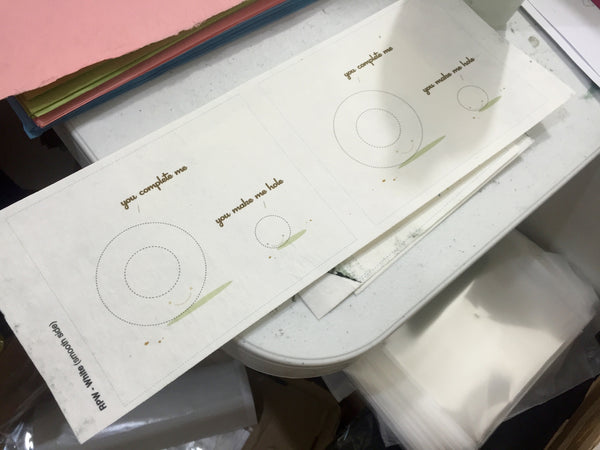
The shape templates are printed on paper, which the women card makers use as a guide. Each card is lovingly made by hand.
The funny and witty designs you see on every card actually come from a team of designers located in San Francisco and employed by Good Paper, their social enterprise partner in the United States. With the paper in hand and the design models they need to follow, the women handcraft each card from start to finish. They don’t work in an assembly line, so they have full ownership over each card (which is why every card is handsigned with the name of the woman who made it). At the end, all the leftover scraps of paper are kept and then thrown back with the recycled paper when the paper is made. There is no waste!
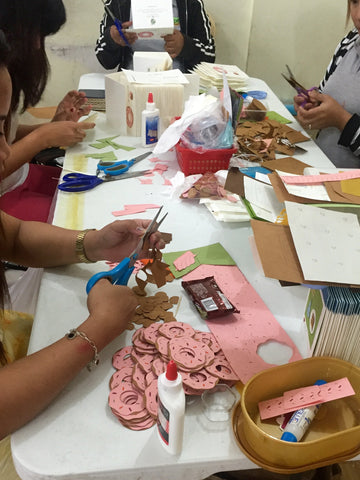
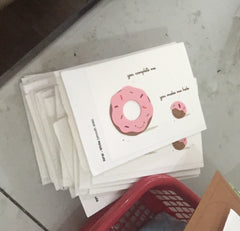
Each woman has full ownership over her work and creates each card from start to finish. That’s why every card is proudly handsigned by the woman who made it.
Why are the cards so great?
When we first started selling these cards, what truly impressed us was the high quality and consistency in design. Every single card looks practically identical to each other. In fact, the quality is so great that some people even ask us sometimes whether they are really handmade! It all began to make sense once Benjamin explained to us the importance of quality control in their processes. Women produce cards in their various locations in Philippines where they are initially inspected for quality. The successful cards are then shipped to their main location in Makati, where they are examined a second time. If at any point in the process the card does not satisfy their quality standards, the card is sent back to the same woman who made it and she gets to fix it herself. This is not an easy process since each rejected card needs to get shipped back to the same woman, but this commitment to quality is a key reason why these cards are so amazing.
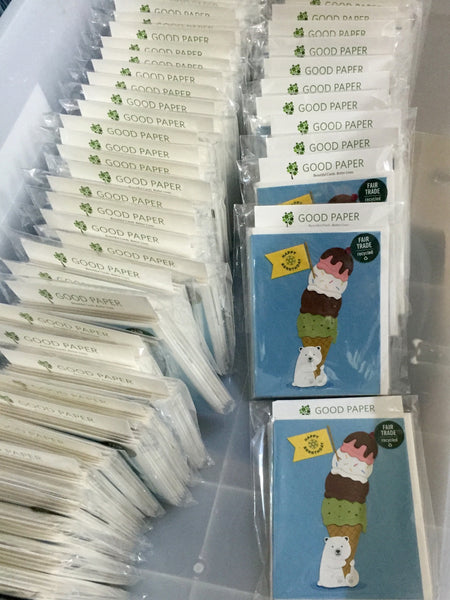
The greeting cards, ready to ship!
Being able to speak in depth with Benjamin and witness the cards being made in person has been truly inspiring. If we didn't already know it, now we’re even more convinced that it just doesn't make sense to buy mass-produced cards from companies like Hallmark when you can purchase high quality cards with unique designs and contribute to a social cause at the same time. You shouldn’t buy socially responsible products out of charity: you should buy great products you love while also knowing that your dollar is helping to improve the lives of real people who need it. This is what Good Paper and The Paper Project do and we hope you agree!
Jérôme Gagnon-Voyer

Jérôme is an IT professional by trade who is passionate about using technology to help non-profits and cause-based organizations scale their impact. He is co-founder of Cambio & Co. – a brand on a mission to share the beauty of Filipino craftsmanship with the world. We provide a platform for the most innovative and socially impactful Filipino brands to grow by showcasing their stories and products - all designed and handcrafted in the Philippines by talented Filipino artisans.



Leave a comment